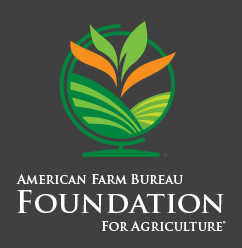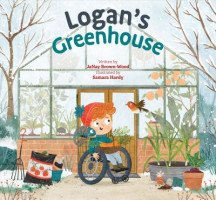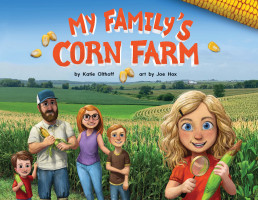Foundation Awards Nearly $9,500 in Grants to Recognize Excellence in Ag Literacy
Ag Education Ag Opportunities Ag Projects Classroom Ag
Jul/12/2022

The American Farm Bureau Foundation for Agriculture has awarded $9,400 in grants to recognize the remarkable agricultural literacy programs of ten state and county Farm Bureaus. The grants are funded through the White-Reinhardt Fund for Education program, which acknowledges communities that are engaging with students on the fundamental role of agriculture in the everyday lives of all Americans.
“We are excited to highlight so many outstanding projects and celebrate the educators and communities that created these programs,” said Daniel Meloy, executive director of the Foundation. “Agricultural literacy programs like the ones selected for grants are inspiring students to understand where their food comes from and how they can be part of innovative solutions to keep agriculture sustainable for generations to come.”
State and county Farm Bureaus may apply for $1,000 grants in support of education programs for grades K-12 in order to initiate new ag literacy programs or expand existing programs. Organizations and schools can work with local Farm Bureaus to apply for the grants, which are available on a competitive basis. Grants are awarded twice a year, in the spring and fall.
The White-Reinhardt Fund is a project of the Foundation that sponsors scholarships and grants in cooperation with the American Farm Bureau Women’s Leadership Committee. The fund is named in honor of Berta White and Linda Reinhardt, two former committee chairwomen.
“A love of learning isn’t limited by the classroom setting,” Meloy said. “Cultivating an excitement for learning about agriculture continues to drive the Foundation toward finding creative solutions to get these resources to students and their educators.”
Fall 2022 White-Reinhardt Grant Recipients
Georgia Farm Bureau
The Georgia Ag Experience, a 36-foot mobile classroom, was launched in 2021 to showcase Georgia agriculture. The Georgia Farm Bureau Foundation for Agriculture realized that the mobile classroom is not well-equipped for special needs and Early Intervention Program students, however, and will use grant funds to create a sensory-based learning station and lesson/activity for these students. This will allow all students to be able to see where their food comes from and see the real-world opportunities in agriculture.
Banks County Farm Bureau, Georgia
Banks County Farm Bureau and Banks County Elementary will use their grant to update their pollinator garden. By adding more plants and flowers, students will be able to study different pollinators in the area. Banks County will also add a vertical garden and cooking equipment so students will be able to see the process from seed to plate.
Union County Farm Bureau, Illinois
Union County Farm Bureau will work with elementary schools in the county to introduce AeroGarden kits for students. The garden container system will be able to be used by multiple classes in each school and show students different growing methods, the plant life cycle and where their food comes from. They will also donate accurate ag books to take learning further for the students.
Sedgwick County Farm Bureau, Kansas
The Sedgwick County Farm Bureau Agricultural Association is partnering with the newly created PBS Kansas Cochener-Garvey Foundation Children’s Education & Discovery Center in Wichita, Kansas. The center will focus on Science, Technology, Engineering, Art and Mathematics topics for young learners and families. The White-Reinhardt grant will be used for a beef display and model that explains beef cuts and other beef facts.
Sherman County Farm Bureau, Kansas
The Sherman County Farm Bureau is creating an Ag Ambassador program for incoming 2022-2023 seniors at Goodland High School. The high school seniors will teach other youth about agriculture with this curriculum and resources. With grant funds, they will also create curriculum for K-12 students that engages each child at an age-appropriate level through agriculture literature, hands on experiments, demonstrations and games. The high school seniors will also use this curriculum to teach other youth about agriculture.
Newton County Farm Bureau, Missouri
The Seneca FFA chapter Agricultural Literacy and Environmental Committees and Newton County Farm Bureau will create an augmented reality sandbox. The sandbox is a 3D, interactive, dynamic educational tool to help understand mapping, topography, watersheds and natural hazards. This display will be used in high school and elementary school classrooms so all students can learn about watersheds and their impact on agriculture.
Wood County Farm Bureau, Ohio
Wood Soil and Water Conservation District will take part in National Read a Book Day, using the Foundation’s Book of the Year, “How to Grow a Monster.” Representatives and members of the local agriculture community will visit county elementary schools to read the book, talk about agriculture and donate books to each library for future use.
Matagorda County Farm Bureau, Texas
Matagorda County Farm Bureau and the Matagorda County Soil & Water Conservation District will purchase a vertical, indoor aeroponic tower growing system to be used for the formation of a “Good-to-Grow” project. This project will consist of a group of students engaging in two different agricultural production methods for growing produce on their school campus: a traditional outdoor soil garden and an indoor aeroponics tower garden. The project is available for all five school districts and the home school association within the county.
Utah Farm Bureau
The Utah State Farm Bureau Women’s Committee will expand its “Seedstock” ag literacy starter kits for each of the 29 counties in Utah. The kits include accurate ag books, lesson plans and other materials. This year, the committee will add six egg hatching brooder kits which include all the supplies to incubate eggs and hatch chicks. These kits will be shared among the 29 counties so every student will be able to see egg incubation and hatching.
Mercer County Farm Bureau, West Virginia
The Wade Center in Mercer County, West Virginia, provides a safe, creative place for at-risk elementary school children to receive after-school help with their homework, reading and math skills and computer proficiency. The grant will allow the Wade Center to incubate and raise a flock of chickens, giving the children a first-hand look at the life cycle, farming practices and the importance of nutrition.
##








